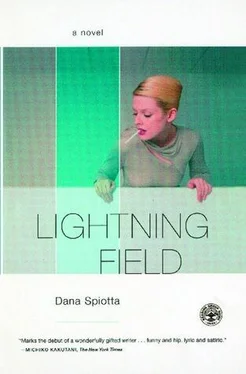Sometimes she caught Mark looking at the three of them like he’d wandered into the wrong house. That is the word, caught, he looked caught, and you could read it as something else, but she knew better.
Lisa began to read less of anything but these stories. She gotto know them so well that if a body was found she knew which kids were still missing, which child it probably would turn out to be. She had a vague feeling that this wasn’t good, thinking so much about these things. Or maybe it was crucial she thought about them. She remembered when they used to put pictures of missing children on milk cartons. So America would wake up in the morning, and there next to their Wheaties and multigrain toast would be the face of some certainly dead child, hopelessly missing for years, computer altered to simulate age. Lisa supposed the milk companies finally wised up and realized that these death cartons were not the most pleasing packaging for their products. She remembered the joke Mark made to her when they saw a small child wandering around the mall by himself, so absorbed in a toy he turned around to find himself separated from Mom. “Look, Lisa,” he’d said with a cryptic smile, “a milk carton kid.” It was true, the solo child was a potential candidate for the milk carton. But those milk cartons on the table — maybe off-putting, but maybe a reminder to the kiddies: Hey, be careful. Hansel and Gretel. To the parents: Pay attention to every second. No second chances in this forever larger and unfamiliar freewayed world.
Second Road Stop: Between Arizona and New Mexico
“Why do I hate the ocean? Well, I don’t, I just don’t have the sentimental fetish for it that all these people do. As if the oceanon the one side and the desert on the other sort of justifies whatever lies between.” Lorene smokes her long cigarette and will not take off her sunglasses. We sit in a bar in a town halfway between Flagstaff and Santa Fe. We sit in the afternoon light and she will not take off her sunglasses.
“The sun is our enemy, don’t you know, Mina, beware always of the sun. Relentless, inexhaustible summer is no way to live your life.” I eat a hamburger. She watches. I can feel her hunger like a wave behind her glasses. I eat with gusto, but not too fast. I sense her watching my every move. She keeps speaking as if we were having a conversation.
“It’s important to live in a place that is affected by seasons. Where time is measured in weather. Where there are constant reminders that your approaching death is inescapable. You know, leaves falling, that sort of thing.” I slurp on my Coke. She lights another cigarette.
“Mud slides don’t count. Disasters, fires, unusual weather systems don’t count. Earthquakes don’t count. They are just random, a kind of meaningless natural hysteria. Earthquakes, when you grow up in California, they are like an E-ticket ride at Disneyland, a joke, a way to make the nonnatives come forth and identify themselves.” The afternoon light on her white face makes her look celluloid, as if she could shift the whole world to black-and-white. Michael said there is nothing more beautiful than white, white skin because it is so unforgiving, so bruisable, and the person inside seems only barely covered. To me her cheek looks cool and poreless, not at all trembly and translucent. But she may have been different then. Or maybe he could see through skin.
“Oh, honey, you’re upset.” Lorene leans toward me as if she could see me only now, as if she had just walked into the room.I feel nothing, but there must have been a sort of look on my face. I stare out the window. A large woman is trying to get her stuff into her tote bag. Kids’ clothes and hairbrush and cigarettes all spilling out. She has blond hair cut close on the sides and left long in back. Her toes press over the edges of her sandals and the nails are not deep red but lollipop red. Her son is tiny beside her, pulling at her. I keep staring at the fat part of the backs of her legs, the part where the skin puckers whitely and it looks as if no nerves are there, that if you touched her flesh she wouldn’t know.
“Lorene,” I say.
“Yes?”
“I think I made a huge mistake.”
“Oh, dear. Do you want to go back, doll?”
“No, no, no. I don’t mean leaving L.A.”
“What do you mean?”
“Oh, Lorene. Oh, God. I’ve made an awful mistake.”
Lorene frowns. She’s not wearing any lipstick. First time ever.
Mina ran the dining room floor for the long lunch shift at Food Baroque. A usual exhaustion of mishaps: strangers agitated and demanding. The bookings changing constantly. The regulars who had to be appeased. The waitresses who had to be constantly reminded of so many tiny details. Mina greeted peoplewith a surface smile and was grateful for the still-heavy protocol of restaurants. There was a structure and an order, and everybody knew it. I say hello. You say hello back. I ask how you are. You smile, nod, and announce the name the booking is under. I take you to a table, you thank me. We know this. First, I offer you a drink. We serve the drinks from the right. We serve food from the left. I show you the label of the wine. I place the cork in front of you. I offer you the taste. This is the way it is done. I fill glasses of the women clockwise from the host, then the men, then I fill the host’s glass. This structure is understood between us, even though I’ve never seen you before. There is a grace and a comfort in these rules. Mina found refuge in them, a kind of beauty. She thought of it, pondered the rules of service, the order necessary to create pleasure. People still feel, however superficially, part of some coherent common culture where gestures among strangers are understood. She missed actually waiting on people. She loved marking the tables between courses with the appropriate silverware. She loved serving the women first, whisking crumbs off the tables with a sliver of metal designed for such niceties. It was about pleasure, the rules of pleasure and service, and Mina marveled at this, and lately inserted little torques in the protocol, not destroying them but emphasizing them by playing with the edges. She would make a tiny personal comment on the wine, or give a piece of silverware an extra twirl as she placed it to mark a table for the next course. She would hold eye contact a second longer than appropriate when asked what the wait for a table was, and then give a minutely precise answer with a deadpan earnestness. She could create ironic service, a swerve to the unexpected that would succeed only because everything was already intact and flawless; only play ifa space exists. And there could be no mistaking that the swerves came from art rather than sloppiness or ignorance. She would never incorrectly serve food from the right and clear from the left — that would be a meaningless erosion of order. Because there was a kind of beauty in this sort of mutually observed propriety. It was pleasing to have gestures to read, rules to respect, structures to subvert.
She had the weekly staff meeting today at Gentleman’s Club. Billie Jean, Nancy, Roxanne, Annette (not their real names) were instructed in the rules of service by Lorene as Mina looked on, nodding. The same things over and over like a prayer, tiny, seemingly insignificant details that architected Lorene’s vision of pleasure. She was so confident in her vision, it hardly mattered whether it was right or not. It was right. Then Lorene went over the schedule, with all of the girls’ astrological charts in hand. No earth signs on the floor with fire signs. The planets dictated these combinations, and that, along with the audition demands of the actress/servers, made the schedule challenging. Mina was left to the task of reconciling all this: the back of the house, the front of the house, the sun, the moon, the pilot season. After she finished and discharged the girls to the evening shift, she had a look at the reservation book. A hopelessly overbooked seven o’clock seating. A wishful booking at nine for a two-hour turn. Not likely. She left the impending disasters of the half-hour waits at the bar and the nearly threatening, polite assertiveness of rich beautiful people who “didn’t want to wait a moment longer, please” to the night manager, Billie Jean, and said she would be at home if needed.
Читать дальше












